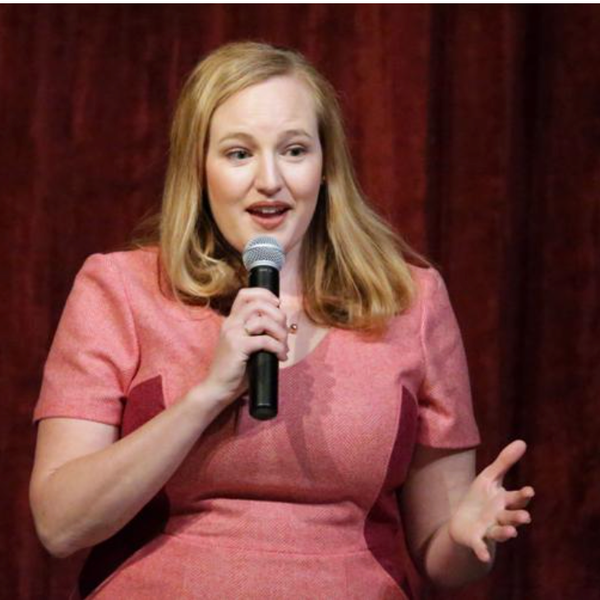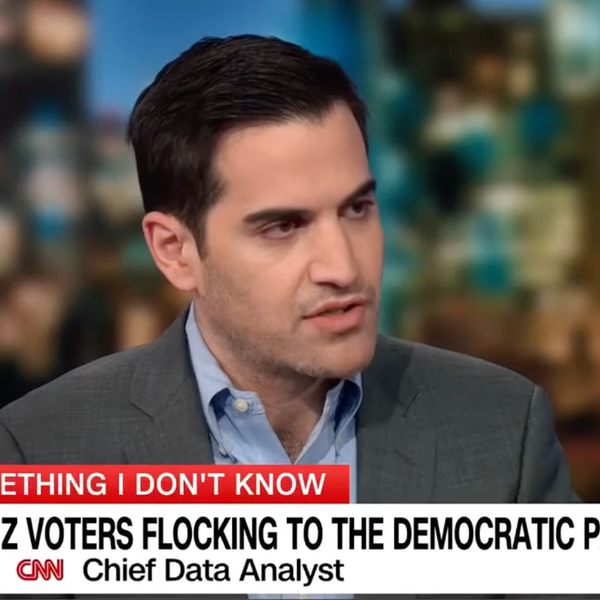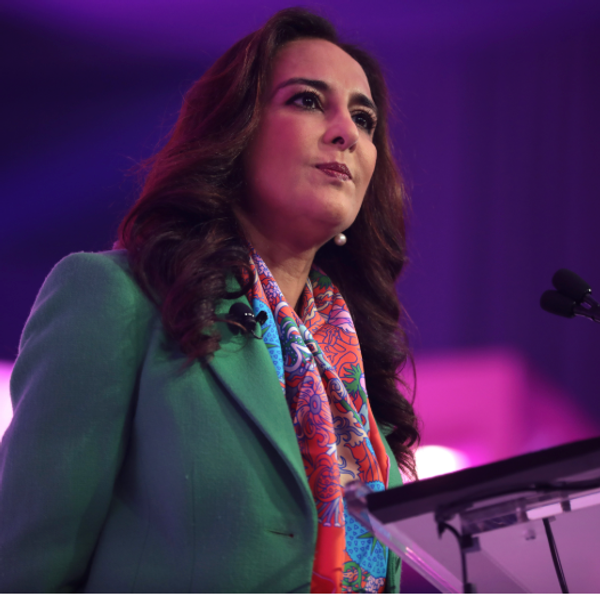Weekend Reader: ‘To Make Men Free: A History Of The Republican Party’

Long before it became the party of big business and tax cuts for the wealthy, the Grand Old Party used to strive for economic equality for all. Those days may be a distant memory — but they could help us understand the Republican Party of tomorrow.
In her new book, To Make Men Free: A History of the Republican Party, historian Heather Cox Richardson explains how the GOP’s past will shape its future. Can party leaders revive the values of Theodore Roosevelt, or will they stick with a dogma of low taxes, small government, and regressive policies?
In the excerpt below, Richardson details Theodore Roosevelt’s catapult to power, and how he focused his energies toward one powerful business: The U.S. Steel Corporation.
You can purchase the book here.
The man most closely associated with this changed concept of liberalism was Roosevelt himself. Although an easterner, he took his political inspiration from the West, where during his sojourn after his wife’s death he had ridden horses, rounded up cattle, and submerged himself in what he saw as essential America: the great West, where men were independent and justice was impartial. Although Roosevelt hired both of his ranch bosses from Maine, he maintained that it was westerners who represented the ideal American. They were hardworking, loyal, helpful, and independent. Although in reality social lines in the West mirrored those of the East, Roosevelt insisted that all westerners met on terms of perfect equality.
Back from Cuba in 1898, Roosevelt decisively won the New York governorship on the promise that he would bring honest western-type government back to a state that symbolized corruption. He told rallies that he would cut through red tape, cater to no special interests, and defend every hardworking man of every race and creed. Even a Democratic paper in far-off South Carolina conceded that he would “make an able Governor and would give the rascals such a shaking up as they have never had.”
Once in the governor’s chair, Roosevelt began to divorce the government from the businesses that had come to control it. He strengthened civil service laws and cracked down on cramped and filthy sweatshops, where immigrants both lived and worked, spending their waking hours turning out piecework, falling into bed, and getting up to go right back to work. Worse in the minds of established machine Republicans, he forced corporations that operated in a public capacity—streetcar businesses, for example—to pay taxes. Businessmen fought him, but he was determined, as he said, to establish the principle that corporations “shall pay their just share of the public burden.”
New York’s Republican establishment finally decided to bury the troublemaking Governor Roosevelt in the obscurity of the vice presidency. Roosevelt initially objected but ultimately decided that his fame would enable him to make his new version of American government national. In 1900, once again opposing William Jennings Bryan, Republicans claimed that Democrats would destroy the country while they, in contrast, had constructed the world’s most successful economy, which they were unselfishly spreading across the world, along with the liberty and civil rights for which America stood. In 1900, McKinley and Roosevelt won with a comfortable six-point lead in the popular vote.
Roosevelt was wrong to think he could change the course of the nation from the vice presidency. Once in office, he discovered that he could not accomplish much of anything. His only official duty was to preside over the Senate, which would not convene until December. He was so bored he asked the chief justice of the Supreme Court if it would be unseemly for him to enroll in law school to finish his degree. (Horrified, the justice offered to supervise Roosevelt’s studies himself.)
Roosevelt fumed, but businessmen made it clear they were not afraid of the new blood in the executive branch. On February 25, 1901, J. P. Morgan combined companies producing two-thirds of the nation’s steel into the US Steel Corporation, capitalized at $1.4 billion—almost three times more than the federal government’s annual budget. Then, on November 13, Morgan’s Northern Securities Company joined the nation’s warring main railroad interests into a new conglomerate designed to circumvent antitrust legislation: a holding company. Even the staunchly Republican Chicago Tribune was taken aback: “Never have interests so enormous been brought under one management.” When midwestern governors suggested that their legislatures would find some way to prohibit such a powerful combination, Northern Securities officials threw gas on the fire by announcing that they would keep all business transactions and operations secret.
But while industrialists had gone about business as usual, in September 1901 an anarchist with the impossible name of Czolgosz (pronounced Cho-goss) assassinated President McKinley, and all bets were off. “It is a dreadful thing to come into the Presidency in this way,” Roosevelt wrote to Lodge, “but it would be a far worse thing to be morbid about it.” Mark Hanna and the Republican Old Guard were less sanguine. “I told McKinley it was a mistake to nominate that wild man at Philadelphia,” Hanna moaned. “I told him what would happen if he should die. Now look. That damned cowboy is president of the United States.”
Roosevelt promptly demonstrated his belief that, like Lincoln, he was the president of every single hardworking American citizen. In October, he welcomed famous black educator Booker T. Washington to the White House, just as Lincoln had welcomed famous black abolitionist Frederick Douglass in 1863. Washington was a commanding figure with searing gray eyes, a well-known leader in both the African American community and Re- publican circles. Seven months before, he had published his autobiography, Up from Slavery, which illustrated how the Republican idea of rising through education and hard work had turned a poor slave child into an important reformer. Southern whites stormed that Roosevelt had insulted the South by dining with Washington. The president retorted: “The only wise and honor- able and Christian thing to do is to treat each black man and each white man strictly on his merits as a man.” Gone were the days of sectional strife: with a southern mother, a northern father, and a western ranch, Roosevelt envisioned himself as the leader of the whole nation.
Roosevelt’s first message to Congress, delivered less than three months after McKinley’s death, honored the idea of individualism and the belief that property must be protected, but it also insisted that the government must clean up industrial America. The government should, first of all, keep out of the country immigrants who were not going to be good American citizens, the new president explained. By this he meant anarchists, like the one who had killed McKinley, and also anyone who did not have “a strong body, a stout heart, a good head, and a resolute purpose to do his duty well in every way and to bring up his children as law-abiding and God-fearing members of the community.” The government should start cleaning up factories and limiting the working hours of women and children, and it should husband natural resources for everyone rather than allowing them to be exploited by greedy businessmen. And of course, Roosevelt added, America should build a strong army and navy in order to spread these principles around the globe.
For all its radical vision of government activism, Roosevelt’s message relieved the party’s Old Guard. Although the new president embraced reform, he opposed sweeping political and economic changes. He supported Republican policies that had shaped the post–Civil War economy; he hoped only to ameliorate the abuses the system had spawned. If reform were going to happen—and by 1901 it appeared imperative—Old Guard Republicans could take comfort that it came at the hands of a Republican rather than an economically heretical Democrat. Older men breathed a sigh of relief that Roosevelt’s message was inherently conservative.
Despite western outrage at the organization of the Northern Securities Company, Roosevelt did not oppose huge combinations. He did not want to destroy big business; he simply wanted the government to supervise and control corporate combinations, preventing criminality in the business world as it did in the streets. He hoped to establish rectitude through transparency. Once people actually knew what businesses were up to, the government could consider regulation or taxation to protect the public interest.
Senators and businessmen who had worried that the cowboy president would slash at the trusts breathed a hearty sigh of relief that all he wanted was “transparency.” That was easy enough to ignore. The Chicago Tribune rejoiced that Roosevelt supported business and had suggested only cautious measures to determine whether or not trusts actually were a problem. In other words, Roosevelt was simply mouthing platitudes. According to the Tribune, the “grave and reverend and somewhat plutocratic Senators immediately admitted in the most delighted fashion that the young and supposedly impetuous President had discussed the trust question with rare discrimination.” For all his reputation as a wild radical, it seemed as if Roosevelt did not intend to reduce the power of big business at all.
The Chicago Tribune and the business-minded senators were mistaken. Roosevelt expected Congress to clean up the system that had permitted the corruption of government by big business and the consequent dramatic migration of wealth upward. At the very least, surely it would look into the machinations that had birthed the railroad behemoth Northern Securities holding company. But senators had no intention of humoring the young president, and months passed without any legislation that took on the trusts. When northwesterners, who had a long history of contending against the railroads, began to grumble about the government’s inaction, Roosevelt stole a march on Congress.
If you enjoyed this excerpt, purchase the full book here.
Excerpted from To Make Men Free: A History of the Republican Party by Heather Cox Richardson. Available from Basic Books, a member of The Perseus Books Group. Copyright © 2014.
Want more updates on great books? Sign up for our daily email newsletter here!








